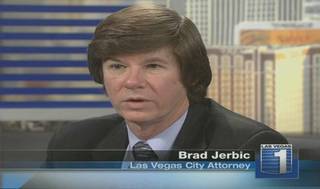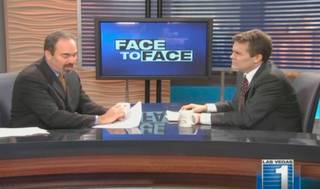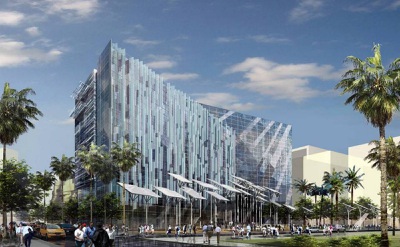Monday, March 30, 2009 | 2 a.m.
Sun Archives
- Anti-city-hall sentiment could alter council ranks (3-23-2009)
- Long shot in city hall war: Compromise (3-18-2008)
- Culinary, city continue City Hall redevelopment battle (3-13-2009)
- City-union legal debate: Are issues fit for voters? (3-8-2009)
- Culinary vows to sue over ballot questions (3-6-2009)
- Council votes to keep questions off June ballot (3-4-2009)
- What led to plan to build city hall absent voter OK (3-4-2009)
- Scramble is on for right to word questions - if they reach the ballot (3-2-2009)
- City Council wins round in City Hall battle (2-27-2009)
- Ross keeps voting despite warning (2-22-2009)
- Union cheers agreement to fund city hall project (2-18-2009)
- Complicated deal, powerful partner (2-7-2009)
No Power to the People?

Viewing video requires the latest version of Adobe's Flash Player
Face to Face: Taj Mahal of City Halls?

Viewing video requires the latest version of Adobe's Flash Player
Worthington Interview
Downtown Las Vegas business owners join the city's fight against the Culinary Union. In Business talks with Downtown Las Vegas Alliance Chairman Richard Worthington.
A government building plan rarely needs its own P.R. firm.
But if the Nevada Supreme Court next month agrees that the Culinary Union’s two measures aimed at reining in Las Vegas’ redevelopment agency must be placed on the June 2 ballot, the court skirmish will serve as just the warm-up for the title bout, in the court of public opinion.
In other words, a public relations battle is looming.
So Cleveland-based Forest City Enterprises, the developer working with Las Vegas officials on the plans for a new city hall that are in Culinary’s cross hairs, has retained b&p, until recently known as Brown & Partners, a Las Vegas advertising and public relations shop.
Forest City and its ad agency are keeping mum for the time being regarding strategy. On the other side, the union has made clear what its effort would look like, in part through a couple of fliers: The proposed new city hall is a waste of $267 million in taxpayer money, they say. Mayor Oscar Goodman and his cohort want to build themselves a Taj Mahal that taxpayers can’t afford.
Suffice it to say, Las Vegas voters can count on being bombarded with ads. The two sides will fight flier with flier and will buy more TV ad time than prime-time viewers can stand.
Forest City needs the P.R. firm because we’re not talking about just a candidate who has no name recognition, but the city redevelopment agency’s circular financing system, which most voters don’t understand. So on top of arguing the merits of that system and the way Las Vegas has used it, the campaign will have to explain that system.
That may be more important for the city and its allies than the Culinary because the city’s position is less readily understandable. In a nutshell, the city is arguing that it needs the ability to give tax breaks and other financial incentives to developers to lure them downtown. Without those incentives, developers have been reluctant to undertake projects in rough urban areas.
The Legislature created the city’s redevelopment area in 1986 to help prevent decay in downtown Las Vegas by supporting such development projects with tax revenue collected within those districts.
The city is prevented by law from spending taxpayer money on making its case for the redevelopment agency and its system. But city allies — including Forest City and the Downtown Las Vegas Alliance, a coalition of downtown’s largest businesses — are preparing arguments on the city’s behalf.
Although Forest City is keeping silent for the time being, other downtown alliance members are starting to hint at arguments they would likely make to the public.
The city’s supporters say they may argue that any possibility of a thriving downtown depends on the Culinary’s two measures failing. The city’s redevelopment efforts — including the financial and tax incentives it uses to lure developers downtown — are necessary for downtown to thrive.
Success of downtown developments — from the huge new “second downtown,” Union Park, to the arts district and the Fremont East entertainment area — depends on the ability of the redevelopment agency to operate without the need for voter approval, city allies say.
If the Culinary wins, these advocates say, parts of downtown will fester and ultimately become unredeemable.
“We’re going to have to educate the voters,” said the leader of the downtown business alliance, Rich Worthington, president of the Molasky Group. He notes that his argument has nothing directly to do with the city hall project, which he said he doesn’t “give a damn” about.
“Downtown and its health affects everyone in the valley,” he said. “It’s a little like saying, ‘I’m going to ignore the gangrene growing on my foot.’ A community is only as healthy as its weakest link.”
Another member of the alliance, Dick Geyer, president of the Las Vegas Arts District Neighborhood Association, was more stark in his assessment. “If we lose this, I think the downtown is over,” he said. “We’re just done.”
As it is, Geyer said, he has been having difficulty making the downtown arts association grow. Twenty to 25 art galleries are members, he said.
“The reality is that the success the city has had in the last five to six years has been due to the (redevelopment agency), and the incentives it uses,” said Geyer. “But downtown is on the edge of blight. If we don’t turn it around, we’re going to have an unhappy and unhealthy city.”
Worthington said the alliance has not yet hired a public relations firm, though firms have been contacting him. The group also has not yet formed a political action committee, but it is taking steps to do so, he said.
The alliance has retained attorneys, who recently filed a brief in support of the city’s case before the state Supreme Court. The brief was also filed on behalf of several building trades unions.
“Millions, if not billions, of dollars in revenue would be forfeited due to the absence of redevelopment incentives for new businesses,” the attorneys wrote.
Arguments are set to be heard in Las Vegas on April 6 by the full court. It is unclear how long it will take for the court to rule.
In a sign of how seriously the city is taking the matter, the city attorney’s office has retained Las Vegas-based attorney Daniel Polsenberg to make the potentially critical half-hour oral argument to the court, alongside City Attorney Brad Jerbic. Polsenberg is one of the most veteran and respected appellate attorneys in Nevada.
The Culinary, likewise, has two well-regarded lawyers set to argue its case, Paul More and Richard McCracken.


Join the Discussion:
Check this out for a full explanation of our conversion to the LiveFyre commenting system and instructions on how to sign up for an account.
Full comments policy